Best Premises Liability Lawyers in Limerick
Share your needs with us, get contacted by law firms.
Free. Takes 2 min.
List of the best lawyers in Limerick, Ireland
About Premises Liability Law in Limerick, Ireland
Premises liability is a legal concept that holds occupiers or owners of property responsible for accidents and injuries that occur on their property. In Limerick, and Ireland generally, premises liability is based on the duty of care that property owners or those in control of premises owe to visitors, tenants, or even trespassers in certain situations. This area of law regulates compensation claims when someone suffers harm due to unsafe or hazardous conditions, such as slip and falls, defective walkways, unsafe building structures, or inadequate security. The law is designed to ensure that those responsible for properties maintain safe conditions and take reasonable steps to prevent foreseeable accidents.
Why You May Need a Lawyer
Many situations can lead people in Limerick to seek legal advice or representation in matters of premises liability. Common examples include slip and fall accidents in supermarkets, injuries at public buildings, accidents in rented accommodation due to neglect by landlords, and injuries on business premises such as restaurants or pubs.
A lawyer is especially valuable when:
- Liability for the accident is disputed
- You have suffered significant injury and incurred medical expenses or lost income
- The parties responsible deny their responsibility or their insurers refuse to settle fairly
- You need to negotiate with insurance companies or formal legal bodies
- The circumstances of the accident are complicated, such as involving multiple parties or unclear ownership/control
- You are unsure whether you have a valid claim under Irish law
A solicitor experienced in premises liability can help you understand your rights, build a strong case, negotiate settlements, and guide you through the legal process if court action becomes necessary.
Local Laws Overview
Premises liability in Limerick is governed primarily by national Irish law, but local factors, such as property management practices and council regulations, can also play a role. The central legislative framework includes the Occupiers’ Liability Act 1995, which clarifies the duty of care owed by occupiers of premises to visitors, recreational users, and trespassers. Other relevant laws include common law negligence principles, the Safety, Health and Welfare at Work Act for workplace premises, and the Civil Liability Act for certain types of claims.
Key aspects of local premises liability law in Limerick:
- Occupiers have a duty to take reasonable care to ensure visitors and, in certain cases, trespassers are not injured on their property
- The level of duty of care depends on the legal status of the injured person (visitor, recreational user, trespasser)
- Contributory negligence by the injured party can reduce the amount of compensation
- There are clear time limits for bringing claims, usually two years from the date of the accident under the Statute of Limitations
- Local authorities can sometimes be liable for defects on public footpaths or roads
How the law is applied can depend on the circumstances of each case. For example, the responsibility of a landlord may differ if the injured person is a tenant versus a visiting guest or tradesperson.
Frequently Asked Questions
What is premises liability and how does it apply in Limerick?
Premises liability refers to the legal responsibility of property owners or occupiers for injuries sustained by people on their premises due to unsafe conditions. In Limerick, Irish premises liability laws apply, and it is important for those in control of property to maintain a safe environment.
What kinds of accidents are covered under premises liability?
Accidents covered include slips, trips, falls, injuries caused by faulty stairs or floors, accidents due to poor lighting, and injuries from defective or dangerous conditions in or around a property.
Who can be held liable if I am injured on someone else’s property?
Possible liable parties include property owners, tenants, landlords, businesses, local authorities, or anyone who has control over the premises where the accident occurred.
What should I do if I am injured on someone’s property?
Seek medical attention immediately, report the incident to the person responsible for the property, gather evidence such as photographs or witness details, and consult a solicitor as soon as possible.
How long do I have to bring a claim for personal injury due to premises liability?
In most cases, you have two years from the date of the accident to bring a claim, but it is advisable to begin the process as soon as possible to ensure evidence is preserved.
How is liability determined in premises liability cases?
Liability is determined by assessing whether the occupier or owner took reasonable steps to ensure safety, if the hazard was foreseeable, and if the injured party contributed to the accident by their own negligence.
Can I claim against a local authority for an injury on public property?
Yes, if the local authority failed in its duty to maintain public spaces, such as footpaths or parks, and this failure directly led to your injury, you may have grounds for a claim.
Can a trespasser make a claim for injuries?
Yes, but the duty owed to trespassers is lower than to invited visitors. However, property owners may still be found liable if they intentionally or recklessly cause harm.
Do I need evidence to support my premises liability claim?
Yes, evidence such as photographs, witness statements, medical records, and incident reports will strengthen your case and improve your chances of a positive outcome.
Will my case go to court?
Many premises liability claims are settled outside court. However, if a fair settlement cannot be reached, taking the case to court may be necessary. Your solicitor will guide you through this process.
Additional Resources
If you need further guidance or information, consider consulting the following resources:
- Limerick City and County Council – for issues related to public property or council-owned premises
- Citizens Information – offers accessible, government-backed advice on personal injury and legal entitlements
- Law Society of Ireland – provides a directory of qualified solicitors in Limerick specializing in personal injury
- The Personal Injuries Assessment Board (PIAB) – the statutory body in Ireland that assesses most personal injury claims (excluding medical negligence)
- Health and Safety Authority (HSA) – for workplace-related premises liability issues
Next Steps
If you believe you have suffered an injury as a result of unsafe property conditions in Limerick, you should take certain steps to protect your rights:
- Seek medical attention immediately, both for your health and as a matter of record
- Document the scene of the accident as thoroughly as possible with photographs and notes
- Report the incident to the property owner, occupier, or local authority as appropriate
- Contact a solicitor with experience in premises liability law to discuss the specifics of your case
- Do not sign any settlement agreements or make formal statements to insurance companies without legal advice
Taking timely action increases your chances of a successful claim. Engaging with a qualified premises liability solicitor in Limerick can help ensure your interests are properly represented and that you receive appropriate compensation for your injury.
Lawzana helps you find the best lawyers and law firms in Limerick through a curated and pre-screened list of qualified legal professionals. Our platform offers rankings and detailed profiles of attorneys and law firms, allowing you to compare based on practice areas, including Premises Liability, experience, and client feedback.
Each profile includes a description of the firm's areas of practice, client reviews, team members and partners, year of establishment, spoken languages, office locations, contact information, social media presence, and any published articles or resources. Most firms on our platform speak English and are experienced in both local and international legal matters.
Get a quote from top-rated law firms in Limerick, Ireland — quickly, securely, and without unnecessary hassle.
Disclaimer:
The information provided on this page is for general informational purposes only and does not constitute legal advice. While we strive to ensure the accuracy and relevance of the content, legal information may change over time, and interpretations of the law can vary. You should always consult with a qualified legal professional for advice specific to your situation.
We disclaim all liability for actions taken or not taken based on the content of this page. If you believe any information is incorrect or outdated, please contact us, and we will review and update it where appropriate.












